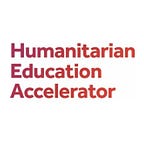Learning Paper: Financing Scale
Innovations in Education in Emergencies and Protracted Crisis “EiEPC” seek to improve access and quality of education. They also aim to deliver cost and resource efficiency — alleviating the pressure that decades of under-funding in EiEPC has caused. Unfortunately, like all innovations in the humanitarian space, impactful EiEPC innovations face barriers to reach sustainable scale.
The HEA has undertaken research to explore one of the biggest and most common barriers to scale: financing. The financing landscape for scaling EiEPC innovations is complex. There are various types and sources of financing — each with requirements and limitations. Our Learning Paper on Financing Scale aims to demystify the financing landscape, so that innovators better understand their options, and donors, fund managers and other stakeholders can adjust and enhance their support. Our Learning Paper cover at the following:
- The different stages of scale: Recognising that scaling is not just one step or process and therefore requires different sources and types of financing;
- The different scaling pathways that can lead to sustainable scale: Noting that different pathways can open up, or close off financing opportunities;
- The financing types and sources: Describing and comparing the different types and sources of financing available for scaling EiEPC innovations; and
- The activities and work to be done to prepare for and support scale: In order to understand how the different sources of financing can be used for scaling EiEPC innovations.
A number of types or sources of funding for scale are identified, ranging from small one-off innovation grants, to sustainable funding sources such as government budgets or long term humanitarian and development funding. Unfortunately, there remains a disconnect between these types or sources of funding, particularly when innovations enter the “messy middle” (McClure & Gray 2015) of scaling, where financial support is less obvious or forthcoming. This gap in the financing pipeline needs to be addressed to better enable EiEPC innovations to reach their full impact. The Learning Paper concludes with recommendations for how this can be done.
To read the full paper, please click here.
